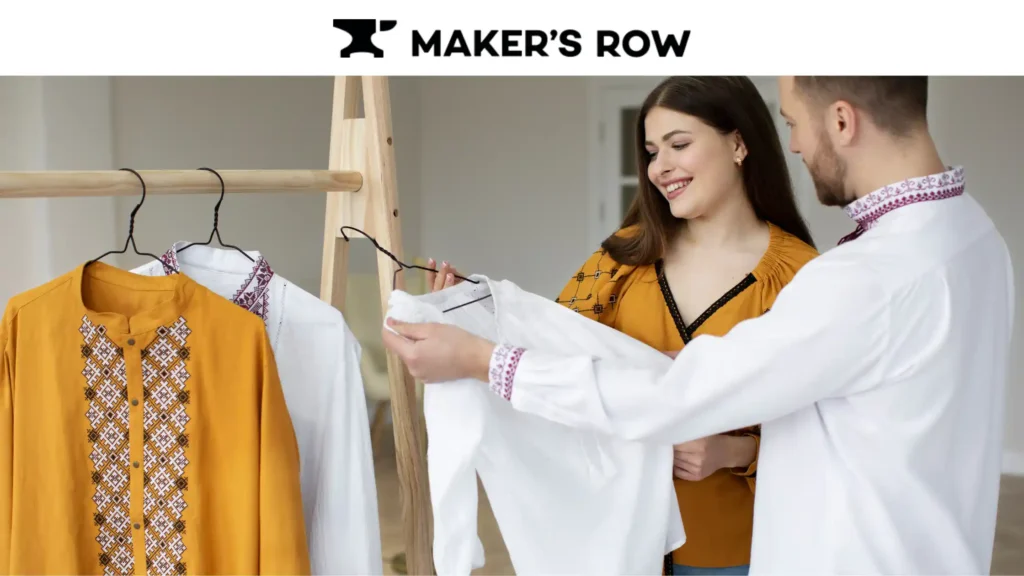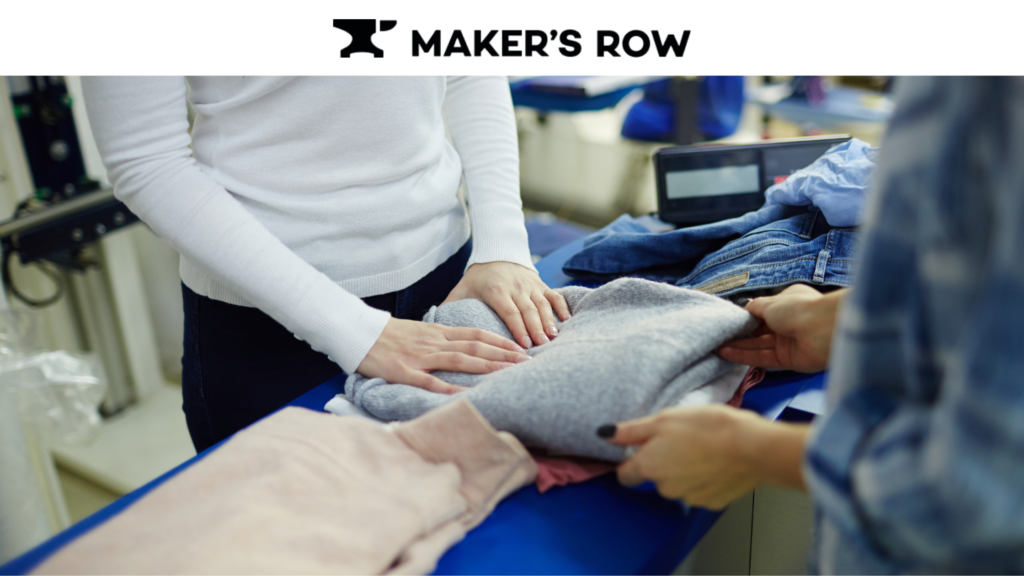Quality control in sustainable fashion manufacturing has now become critical as the fashion world expands and evolves. A major issue that has emerged is sustainability. Today, customers are becoming more conscious and want to select products that are environmentally friendly and produced through ethical means. Such demands are where brands try to capitalize, and the meeting point of quality, sustainability, and ethical labor ensures that the fashion business also aims to do well.
This blog post discusses quality control in sustainable fashion manufacturing, how it contributes to sustainable fashion, and the potential and actual success of the fashion industry.
Maker’s Row can help in promoting sustainable fashion and ethical manufacturing by providing a list of manufacturers who care about quality control. Brands can get in touch with factories that will provide high-quality goods without being harmful to people or the planet. Brands can find contacts who are driven by better norms and values to create long-lasting sustainable wear.
Book a Demo!

Quality Control as Part of Sustainable Fashion
Quality control is the act of maintaining the standard of the products that are to be produced for the consumers. This is because in the sustainable fashion manufacturing process, quality standards are of great importance since they affect the wear and durability of the clothing. There is a tendency to return to a previous clothing item if a present one wears out quickly.
If quality standards are measured accurately during the quality control process, then the material stocked for production will minimize wastage.
Sustainable quality assurance issues are not only related to looks but also to high standards that promote sustainable processes.
For instance, when choosing dyes, fabrics, and ethical manufacturing processes to be used, there is a need to choose what is environmentally friendly. By practicing quality control, fashion brands can regulate their usage and thus have a beneficial impact on the health of the planet.
In this respect, quality assurance also preserves against any shorthands that might violate ethical manufacturing processes. Quality control management means that garments are produced under fair labour conditions and by using materials that have been sourced legally.
Ensuring Eco-Friendly Practices Through Quality Control
Sustainable fashion essentially focuses on environmentally friendly functions where quality control is a core component of these activities. Quality assurance guarantees the best quality of supply materials, for example, organic cotton or recycled textiles, together with environmental policies.
This also assists brands to conform to the fact that they are not violating environmentally friendly processes of production like that of water conservation and usage of chemicals.
While sustainability has become the buzzword of the century in the fashion industry, this piece argues that with poor quality control, such claims may be empty.
Greenwashing, whereby organizations make fake claims that their products are environmentally friendly, can be avoided if the quality assurance is transparent. Applying high-quality standards, a brand will ensure that it does not lie to its consumers by labeling its products as eco-friendly when they are not.
Furthermore, quality control assists in confirming whether specific items are carbon neutral or produced without excess waste. Monitoring helps to maintain sustainable standards right from the procurement of raw materials to the final product without relaxing along the processing line.
Upholding High-Quality Standards
Quality is one of the main aspects on which sustainable fashion is based. Sustainable garments are expected to be longer lasting, of better quality, and more economical to wear than regular, faster-fashion clothes. As a result, maintaining quality is very important. If the aspect of quality control is ignored, sustainable fashion manufacturers are more likely to develop garments that consumers will not find worthy to purchase or inland with a sustainable ethos.
Fashion quality control in ethical manufacturing is the ability to enhance the quality of a clothing piece, thus influencing all the phases of a garment’s life cycle. Using high-quality fabric means that the product will not require constant repair and replacement as compared to using low-quality fabrics.
This goes in line with the objectives of sustainable fashion, which focus on the reduction of short product lifecycles and the encouragement of long-lasting products. Purchasing managers unaware of better quality control measures ought to update themselves, as this way the consumer’s investment and the environment are supported.
Quality control checkups during the course of garment production ensure that a faulty garment is detected before it can reach the market. This not only protects the brand reputation in case the products are not up to customers’ expectations but also leads to a decrease in waste.
Ethical Manufacturing and Quality Control
Looking at sustainable fashion, one cannot separate ethical fashion production from it. Ethical manufacturing can be defined as fair treatment of workers, the use of a healthy working environment, and strict compliance with labour standards.
Quality control checks that these ethical standards are observed, and strict action is taken against the companies that fail to observe them. Brands, through maintaining good quality control, look for signs like child labour and poor working conditions in the supply chain. Policies assist in maintaining the reputation of the right standard from the time the product is processed to the time it is packaged.
The process of ethical manufacturing corresponds with the quality of the end product. Fair trade garments are made excellently because employees are qualified, dedicated, and more sensitive to their work.
As you may know, fast fashion garments expose a long production line where compromises are made to save time and money, resulting in poorly made products. Ethical manufacturing observed by quality control entails the making of better quality and sustainable garments that allow workers and consumers to be satisfied.
Reducing Waste and Enhancing Sustainability
Reducing the amount of waste is another aim of sustainable fashion, and quality control helps to cut the amount of thrown-away items. Cheap clothes, therefore, are expected to be used for a short period and lead to huge amounts of waste that end up in landfills. On the other hand, high-quality garments have durability, meaning they can be used for a long period before they are replaced with some other clothing piece.
When it comes to quality control, sustainable fashion brands can be certain that only the best quality clothes will go forth into the world. This helps to minimise returns, wastage, and the danger of overproducing. Also, quality control eliminates overstock, a situation pervasive in fashion companies that results in products being left on the shelf or disposed of by burning.
Consumer Trust and Brand Reputation
Quality control cannot be said to only concern itself with the production processes involved in ethical manufacturing but is an important force behind consumer confidence. Especially in sustainable fashion, the buyer has become wiser about the brands they want to support based on their transparency.
Consumers also feel confident about a brand that continually produces good-quality apparel that is made from ethical methods as well as sustainably sourced materials. Quality control is a way for brands to assure customers that they focus on sustainability and ethical manufacturing. Without it, brands can be exposed to loss of trust.
Brands that really care about how sustainable they are have higher chances of being noticed in the sea of similar brands, for sure. People are willing to pay an additional amount for products if they are aware of the sustainable way the product was made.

Sustainability Through Maker’s Row
Maker’s Row contributes to sustainable fashion manufacturing by providing transparent and trustworthy connections between brands and reliable factories. This gives consumers’s exposure to manufacturers who strictly maintain the quality of the materials used and environmental standards in their manufacturing processes.
Fashion brands can ensure that only suppliers with a similar goal towards sustainability, minimisation of wastage, conservation of resources, and creation of long-lasting and enduring clothes will join them through Maker’s Row. The platform thus offers brands visibility and enables brands to track their supply chains and ensure that they adhere to environmental and ethical standards, enabling them to assist in achieving responsible fashion. Click here to know more.
Book a Demo!
Conclusion
In the now global fashion arena, sustainability is an expectation from the producers; it is not only the foundation of quality assurance that can effectively control the socially sensitive aspect of sustainability. It makes sure sustainable practices are implemented throughout the supply chain of the ethical manufacturing process. With the increasing number of people seeking clothes that are environmentally friendly, of high quality, and made under proper ethical standards, quality control in sustainable fashion is set to rise even higher.
Read More…